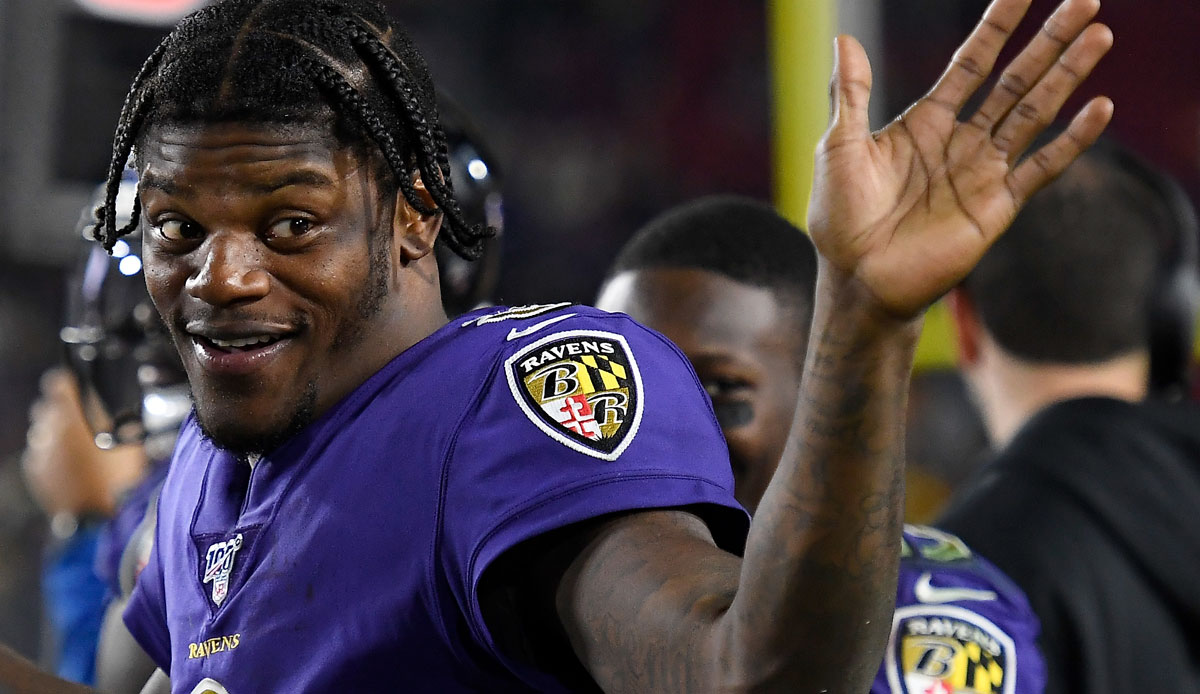Lamar Jackson is entering his final year with the Baltimore Ravens and has yet to sign a new contract. To make matters worse, negotiations are proceeding unusually due to his special circumstances.
The league year 2022 begins in a few days, on March 16 to be precise. It is likely that quarterback Lamar Jackson will still not have signed a new contract with the Baltimore Ravens. That would see him enter the last year of his rookie contract.
Not a very tempting perspective – for both sides. Of course, both sides can also come to an agreement in the course of the summer or even during the upcoming season without any time restrictions, but otherwise this current deal would actually end in the coming spring. And a franchise quarterback with an expiring contract is not a dream scenario for any team.
Recent history has shown that once teams have found their QB of the future, they do well to establish clarity early on. The Kansas City Chiefs, for example, extended Patrick Mahomes, whom they drafted in 2017, at the first opportunity, i.e. after three years in the NFL in summer 2020. The Buffalo Bills did the same a year later and the Houston Texans also managed to To bind Deshaun Watson long-term before his fourth season in September 2020 – even if this relationship went down the drain shortly afterwards.
But all of these teams had found a franchise QB and wasted no time in making them permanent. It should be clear that this is expensive – it is by far the most important position in football. Mahomes earns an average of $45 million, Allen $43 million and Watson $39 million.
Lamar Jackson: Cousins and Prescott as cautionary tales
On the other hand, what happens if you wait too long and actually let it come to a situation in which a star QB reaches his final year of contract and then completes it, is shown by the situations of the Dallas Cowboys or in Washington, where you do it failed to extend in time with Dak Prescott or Kirk Cousins.
Cousins was held twice per franchise tag before defecting to the Minnesota Vikings without compensation in 2018. And Prescott also got the (exclusive) franchise tag in 2020, costing the franchise more than $31 million for a year.
That may be an acceptable price from today’s perspective, but it was still quite high in 2020. More problematic, however, was the timing of this story. Because the fact that a new deal was only agreed on in 2021 – also after a franchise day – the competition had already created several precedents for franchise QB salaries. The market was significantly bloated compared to previous years, when the Cowboys preferred to hand out expensive contracts to edge defenseman DeMarcus Lawrence ($105 million over 5 years) and running back Zeke Elliott ($90 million over 6 years). The latter is still troubling the franchise today.
And so, in 2021, Prescott held all the aces and also landed a deal with an average annual salary of $40 million ($160 million over 4 years). Presumably the Cowboys would have avoided this threshold if they had acted sooner.
And that brings us back to Lamar Jackson, although his situation is a little more complicated than that of Prescott and the others. Jackson does without an agent and represents himself in negotiations with the Ravens. He saves a commission of a maximum of 3 percent of his annual salary. But he has to do everything that an agent normally keeps from a player.
Lamar Jackson: Negotiating a Fine Line
“The agent is kind of a buffer. No offense, but that’s what you do as an agent,” former NFL front office staffer Marc Ross (now with NFL Network) explained The Athletic: “I’ve been in negotiations with agents when you say certain things and sometimes yell at the agent. And ten minutes later you say: ‘Okay, let’s find a solution.’ However, with a player in the negotiation, I don’t see a way for that to work.”
In particular, it is a fine line to seriously discuss a contract and its contents, but not to hurt the player’s feelings. How do you stay professional at all times and not get personal – or at least give the impression that it’s not getting personal? When a general manager and an agent get at each other’s hair, it seems normal. And such a conflict does not necessarily have long-term consequences, especially since both sides only really have to deal with each other every few years anyway. However, a GM sometimes has to deal with a player on a daily basis, at least during a season, which, as is well known, lasts about half a year.
So how is the communication going between Jackson and the Ravens and there specifically with GM Eric DeCosta? While the latter admitted the negotiations were “unusual” and proceeding at “Lamar’s pace,” Jackson is the right man for the Ravens.
On the sidelines of the NFL Combine in Indianapolis, DeCosta then spoke in more detail about the situation: “I hope that at some point we will get an overtime. We have discussed this before and I have said before that we are following Lamar. We both have an ongoing discussion with each other and we only spoke recently. He knows where to find me and vice versa.” They also have a “great relationship with each other,” said DeCosta.
In the 2021 offseason it had already looked like an extension with Jackson, but then nothing happened. Accordingly, this topic remains and could continue through the summer and the coming season. Officially not a problem for the Ravens: “We are ready to be there for Lamar whenever he decides to really work on a contract extension,” said DeCosta.
Lamar Jackson: LeBron James as a great role model
But that also means that Jackson is not ready for that at the moment. But what exactly is stopping him? If the preseason made one thing clear, it’s that the NFL is very short-lived. A season can be over for a player from one moment to the next – the Ravens had numerous injuries and even Jackson missed almost six games with a foot injury and a repeated corona infection. There is a risk for every player to injure himself again and possibly jeopardize his future. And a player like Jackson, who runs a lot with the ball himself, is particularly in the sights of every defender.
In addition, Jackson repeatedly emphasized that football is his priority. In other words: During the season he will hardly have the time to think about a new contract.
And he really wants to be successful. Even after his sophomore MVP season in the NFL, he still doesn’t feel fully recognized in the league. In the YouTube show “The Shop” he recently spoke of the prevailing prejudices against black quarterbacks. Jackson said, “They’re slowly dying out, but they’re still around.” And therefore “I need a championship”.
Jackson admitted he’s still nagging that critics and scouts in the pre-draft process had suggested he should attend workouts as a wide receiver because Jackson recalled “wasn’t a real quarterback.” That drives him, just like his role model LeBron James from the NBA, from whom he learns two things: “To be a champion and to be a billionaire. That’s what I’ve been thinking about since I was a little boy. “
The latter could then also be the reason why he has not yet extended. As a quarterback, Jackson is in the enviable position of being able to legitimately demand a monster contract. And the benefit of waiting, especially this year, is that its price could go up significantly in no time.


